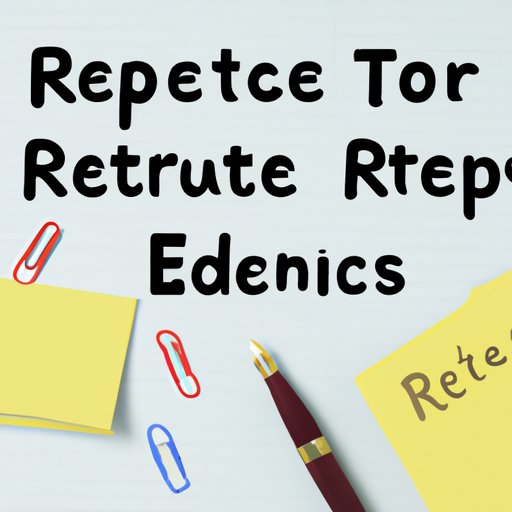Introduction
When someone asks you to be a reference for them, it’s an honor that shows the person trusts you. It also means they think highly of your opinion and believe you can provide an accurate assessment of their skills and abilities. But being a good reference is an important responsibility. You need to understand what’s expected of you and know how to give an effective reference.

Qualities of a Good Reference
A good reference should have certain qualities. These include reliability, honesty, and relevancy.
Reliability
The most important quality of a good reference is reliability. When you recommend someone, employers want to make sure they can trust your opinion. Therefore, you must be honest and consistent in your assessment of the person. If you are not reliable, employers will question your judgment and your credibility.
Honesty
It’s also important to be honest when providing a reference. Don’t exaggerate or downplay someone’s skills and abilities. Employers want to get an accurate picture of the applicant, so be truthful in your assessment. If you don’t feel comfortable recommending someone, it’s best to decline instead of providing an inaccurate reference.
Relevancy
Finally, it’s important to provide a relevant reference. Make sure the information you provide is pertinent to the job the applicant is applying for. For example, if the applicant is applying for a job as a customer service representative, focus on the customer service skills they have and the positive experiences they had in that role.

Tips for Being a Good Reference
Now that you know the qualities of a good reference, here are some tips to help you be an effective reference.
Know the Person You Are Recommending
Before providing a reference, make sure you know the person you are recommending. The more familiar you are with their work and qualifications, the better able you will be to provide an accurate assessment. If you don’t know the person well, it’s best to decline the request.
Make Sure Your Information Is Accurate and Up-to-Date
If you decide to provide a reference, make sure the information you provide is accurate and up-to-date. Employers want to get an accurate picture of the applicant, so double check all facts and figures before submitting a reference.
Write a Positive, but Honest Reference Letter
When writing a reference letter, it’s important to be both positive and honest. Focus on the applicant’s strengths and highlight any accomplishments they achieved while working with you. At the same time, be honest about any areas they need to improve upon or any weaknesses they may have. This will give employers a balanced view of the applicant.
Provide Specific Examples
When possible, provide specific examples of how the applicant performed in their role. This will help employers see the applicant in action and understand their capabilities. For example, if the applicant was a salesperson, you could mention how they exceeded their sales goals or won awards for their performance.
Types of Information Needed When Providing a Reference
When providing a reference, there are certain types of information employers are looking for. This includes employment history, job performance, and personal qualities.
Employment History
Employers want to know the applicant’s employment history. This includes the dates they worked in each role, the duties they performed, and any promotions or awards they received. This information will give employers an idea of the applicant’s work experience and how they progressed in their career.
Job Performance
Employers also want to know how the applicant performed in their role. This includes things like attendance, punctuality, and productivity. Provide specific examples of how the applicant excelled in these areas, such as meeting deadlines or exceeding goals.
Personal Qualities
Finally, employers want to know the applicant’s personal qualities. This includes things like communication and problem-solving skills, leadership ability, and attitude. Describe how the applicant demonstrated these qualities, such as resolving customer complaints or leading a team project.
Examples of Effective References
Now that you know the qualities and types of information needed when providing a reference, here are some examples of effective references.
Sample Reference Letter
One example of an effective reference is a sample reference letter. This is a written document that provides an overview of the applicant’s employment history, job performance, and personal qualities. It should be tailored to the job the applicant is applying for and should include specific examples to illustrate their skills and abilities.
Personal Story
Another example of an effective reference is a personal story. This is a narrative that tells a story about the applicant and how they performed in their role. It should include specific details about the applicant’s accomplishments, such as how they solved a difficult problem or created a successful project. Personal stories are often more memorable and impactful than traditional reference letters.
Conclusion
Being a good reference is an important responsibility. You need to understand the qualities of a good reference, such as reliability, honesty, and relevancy. You also need to know the tips for being a good reference, such as knowing the person you are recommending and making sure your information is accurate and up-to-date. Finally, you need to provide the right type of information, such as employment history, job performance, and personal qualities. Examples of effective references include sample reference letters and personal stories. By following these guidelines, you can ensure you provide an effective reference and help the applicant land their dream job.
(Note: Is this article not meeting your expectations? Do you have knowledge or insights to share? Unlock new opportunities and expand your reach by joining our authors team. Click Registration to join us and share your expertise with our readers.)
